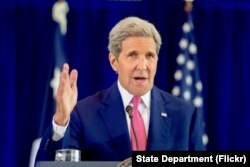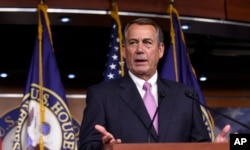Iranian Supreme Leader Ayatollah Ali Khamenei expressed support Thursday for a parliamentary vote in Iran on the nuclear deal Tehran agreed to with a group of six world powers.
He said parliament should not be sidelined in the process, and that he would not tell lawmakers whether to approve or reject the agreement, but would leave it up to them to decide on their own.
His comments come as the U.S. Congress prepares to debate the issue and lodge its own vote by the middle of this month.
US Congress expected to OK deal
U.S. President Barack Obama got a key boost in the process Wednesday with Democratic Senator Barbara Mikulski announcing she would support the deal, known as the Joint Comprehensive Plan of Action (JCPOA). She is the 34th senator to do so, giving Obama the margin needed to sustain a veto against any resolution opposing the deal. Democrats in the House of Representatives say they also will have enough votes to block any attempt to overturn a presidential veto.
A White House spokesman said the administration is "encouraged" by the latest tally of senators who say they will support the nuclear deal. "When the stakes are this high, every vote is important," said Josh Earnest.
Critics have argued it does not do enough to guarantee Iran would not develop nuclear weapons, and would endanger U.S. ally Israel by allowing Iran to use newly unlocked funding to support terrorists.
Kerry urges support
Secretary of State John Kerry said during a speech Wednesday in Philadelphia that backing away from the agreement would be destabilizing.
“Not only will we lose the momentum that we built up in pressing Iran to limit its nuclear activities,” Kerry said. “We will almost surely start moving in the opposite direction. "
The address to a group that included religious organizations and students was Kerry's latest effort to appeal for the American public's support for the deal that he helped negotiate in July.
“I believe, based on a lifetime’s experience, that the Iran nuclear agreement is a hugely positive step," he said.
As Kerry spoke in Philadelphia, the State Department released letters that Kerry sent to both houses of Congress, urging lawmakers to support the agreement.
“We share the concern expressed by many in Congress regarding Iran’s continued support of terrorist and proxy groups,” said Kerry in the letter to members of Congress.
“We have no illusion that that behavior will change following the implementation of the JCPOA. That is precisely why we have focused on preventing Iran from acquiring a nuclear weapon,” he said.
Republican opposition remains steady
Overall, congressional Republicans remain sharply opposed to the deal.
“When I’m president, we won’t just reverse President Obama’s dangerous Iran deal. We will increase sanctions on Iran,” said Senator Marco Rubio, a Republican presidential contender.
Also, after Senator Mikulski announced her support of the deal, a spokesman for Republican House Speaker John Boehner issued a statement declaring the political fight in Washington is not over: "Forcing a bad deal, over the objections of the American people and a majority in Congress, is no win for President Obama."
Boehner said, "The White House may have convinced just enough Democrats to back an agreement that legitimizes Iran's nuclear program, trusts the regime to self-inspect and offers amnesty to terrorists, but this deal is far from being implemented."
Jewish group weighs Kerry speech
Several members of the Jewish Federation of Greater Philadelphia were among those attending Kerry’s speech. The group had earlier announced its opposition to the Iran nuclear plan, saying it could “increase the amount of risk to Israel.”
After the speech, federation CEO Naomi Adler said “whether it changed our mind [as a group] is actually not something that I know.”
Adler said Kerry made a “strong, passionate and compassionate speech.” But she added that many members of the federation are concerned about “Iran sponsoring terrorism against Israel” and other countries in the Middle East.
Americans divided on deal
A University of Maryland poll released this week shows Americans remain significantly divided over the Iran nuclear deal.
The survey, conducted by the school’s Program for Public Consultation, showed 55 percent of Americans polled support congressional approval of the agreement, “despite serious concerns about some of its details.”
It said 23-percent support increasing sanctions on Iran, instead, and an almost equal amount wanted either renewed negotiations to get a better deal or to threaten Iran with military strikes.




